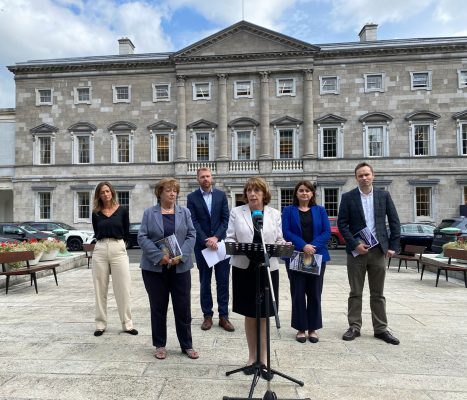Immediate threat to living standards and long-term challenges must be met
Protecting the most vulnerable from the cost-of-living crisis is the key priority in the Social Democrats’ alternative budget, published today.
The party’s alternative budget document, ‘Responding to the Crisis: A Social Democratic Approach’, aims to strike a balance between dealing with the immediate threat of rising prices while meeting the long-term challenges we face as a society.
Some of the main features of our budget include:
- €1.5bn in energy supports for households. This would provide cash payments to workers on a graduated basis – €800 to households with incomes of less than €50,000; €600 for households with incomes of less than €100,000; and €400 for households with incomes of less than €120,000.
- €1bn Energy Crisis Support Scheme for businesses.
- A windfall tax on energy companies.
- Significant investment in solar energy, with 100,000 households to benefit from solar panels.
- Genuinely free education, to include free books, classroom resources, school transport, an increased capitation grant and an end to voluntary contributions.
- A levy on investment funds to ensure they cannot avoid tax.
- A punitive tax on vacancy and dereliction so that desperately needed homes come back into use.
- Start to reduce third level fees, beginning with a €500 reduction in 2023.
- Increases to important welfare payments. This includes a €15 increase in core social welfare payments; an increase the weekly Fuel Allowance payment from €33 to €48; expanding eligibility for Fuel Allowance to recipients of the Working Family Payment; and a double social welfare payment in 2022, separate to the Christmas bonus.
- A Cost of Disability weekly payment of €20 for the first time in the history of the State.
- A reduction in childcare fees by 60 percent over two years.
- Addressing the crisis in home care supports with pay parity for Section 39 organisations.
- Increased access to free GP care for under 12s and increased access to GP visit cards for those aged 60-69, benefitting up to 275,000 people.
- The abolition of inpatient charges for all patients, saving them up to €800 per annum.
- A rise in the Minimum Wage increase by €1.50 to €12.
- A reduction in public transport fares by 30 percent and a cut in off-peak travel fares by 50 percent to avoid capacity constraints.
Speaking at the launch of the alternative budget, Roisin Shortall TD, co-leader of the Social Democrats, said:
“Before the current inflationary crisis, the cost-of-living in Ireland was already 36 percent above the EU average and we were the second most expensive European country in which to live. This meant that when prices began rising quickly, Irish people had little room for manoeuvre.
“Next week’s budget has to meaningfully address the twin energy and cost-of-living crises by putting money back in people’s pockets. In this alternative budget we have outlined the substantial assistance that we would immediately provide to low and middle income families to help them withstand the coming winter.”
Co-leader Catherine Murphy said:
“The cost-of-living crisis has been significantly exacerbated by the decades of underinvestment in critical public services that preceded it. We must address the chronic deficits that exist in our public services.
“The Social Democrats believe that investment in public services is crucial if we want to ensure that costs, which the Government can control, are kept down. In this budget, we have outlined a number of significant investments we would make – in housing, healthcare, childcare, education and public transport – that would help to lower costs across the economy and provide real relief for workers and families.”
ENDS
September 21, 2022
You can download the full Social Democrats’ alternative budget here.

